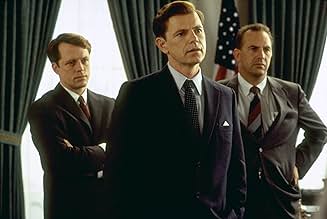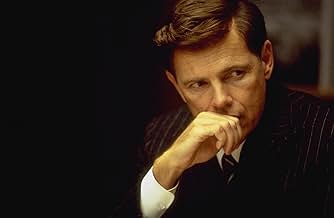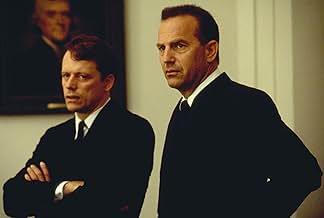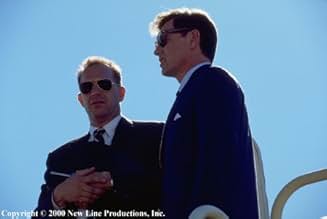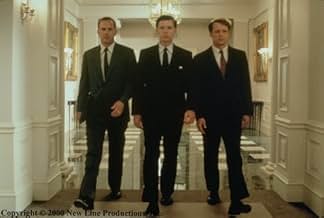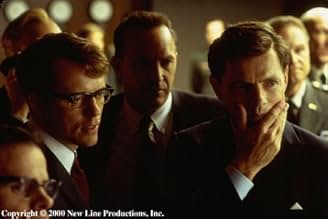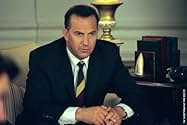En octubre de 1962, la administración Kennedy intenta contener la crisis de los misiles cubanos.En octubre de 1962, la administración Kennedy intenta contener la crisis de los misiles cubanos.En octubre de 1962, la administración Kennedy intenta contener la crisis de los misiles cubanos.
- Dirección
- Guionistas
- Elenco
- Premios
- 3 premios ganados y 8 nominaciones en total
- Dirección
- Guionistas
- Todo el elenco y el equipo
- Producción, taquilla y más en IMDbPro
Opiniones destacadas
I served aboard the USS Joseph P. Kennedy which was depicted in the film. The Kennedy was the ship that boarded the Marcula in the waters off the Bahamas. The Kennedy, now part of Battleship cove in Fall River, Ma., actually played herself in the film. The actual boarding was not as quite dramatic as depicted in the movie.
The boarding party for instance did not wear dress white uniforms and the Marcula was more of a "rust bucket" than depicted in the movie. Although the 5 inch guns were aimed at the vessel, I don't recall a shot being fired.
As far as the movie is concerned I though it gave a rather accurate accounting of the circumstances that surrounded this time in history with a few embellishment's that are purely thrown in as theatrical license.
The boarding party for instance did not wear dress white uniforms and the Marcula was more of a "rust bucket" than depicted in the movie. Although the 5 inch guns were aimed at the vessel, I don't recall a shot being fired.
As far as the movie is concerned I though it gave a rather accurate accounting of the circumstances that surrounded this time in history with a few embellishment's that are purely thrown in as theatrical license.
Shown through the eyes of presidential aide Kenneth P. O'Donnell (Kevin Costner), we see the inner workings of President John F. Kennedy (Bruce Greenwood) and his closest advisors as they try and find the best way to end a potentially devastating showdown with the U.S.S.R. In October of 1962, the U.S., during a regular mission photographing Cuba, spotted a missile buildup by the Russians. The missiles were powerful enough to kill 80 million Americans with only 5 minutes of warning time. President Kennedy had to decide quickly what action to take. With his trusted aide Kenny O'Donnell and his brother Attorney General Robert F. Kennedy (Steven Culp), and others such as Robert McNamara, Adlai Stevenson, McGeorge Bundy, Dean Acheson, Dean Rusk, and many more, Kennedy needed to figure out the best course of action. If he allowed the Russians to aim these missiles at the U.S., the United States would be placed in a potentially deadly situation. If Kennedy allowed the military to attack the missiles and destroy them, what would Russia do as a response? If he waited too long, would Russia simply attack the U.S.? If he backed down and agreed to take down U.S. missiles in Turkey, would the U.S. then look weak to the rest of the world? For such a young President, Kennedy had a lot of tough decisions to make, in a short amount of time, with the world hanging in the balance.
I wasn't alive during the Cuban Missile Crisis as it occurred, so seeing Thirteen Days was like having a history lesson at the same time as having great entertainment. Even though I knew that we didn't end up in World War III, there were a lot of things I didn't know. I won't go into any of the specifics, but I never fully understood how close we came to destroying the planet. The tensions of the time were brought out successfully by director Roger Donaldson. You could see and feel the sweat on all the major players as each minute ticked by. Bruce Greenwood did a tremendous job as the young President Kennedy, showing how Kennedy was strong enough to stand by his morals and values, even as his most trusted advisors were urging him to go to war. At the same time, Greenwood was able to portray Kennedy as someone who needed help and was able to turn to his brother for guidance. Kevin Costner did a good job as Kennedy's presidential aide. I especially liked his boston accent. Costner was a strong personality that worked well with Greenwood and Steven Culp. I believed that the three of them were friends for 15 years and that they trusted each other with their own lives. Other acting standouts to me were Dylan Baker as Robert McNamara and Michael Fairman as Adlai Stevenson.
Even running at almost two and a half hours, I was always at the edge of my seat, wondering what was going to happen next. Like I said before, I wasn't even born yet, nor was it something I ever learned about in school, so I had no idea what was going to happen. It was nice being able to get deep inside the mind of these important people during this crucial time. Of course, I have no idea if what was said during these meetings was actually said in real life, but I'd like to believe that at least the outcomes of the meetings were true. I'm a big fan of these kinds of dramatic films based on real life events. While being entertaining, they also have the ability to teach you about history. Reading about these situations in books isn't nearly as enjoyable as being able to watch them on screen. I think screenwriter David Self did a great job of bringing these real life events to life on the big screen. He made it historical but didn't bore you with too much talk or information. Along with Donaldson, he gave you what you needed to know, and let the actors bring you into the action.
So overall, I thought Thirteen Days was a great film. Well acted, well directed, well written, nice musical score and very entertaining throughout. And if you happen to learn something along the way like I did, then even better.
I wasn't alive during the Cuban Missile Crisis as it occurred, so seeing Thirteen Days was like having a history lesson at the same time as having great entertainment. Even though I knew that we didn't end up in World War III, there were a lot of things I didn't know. I won't go into any of the specifics, but I never fully understood how close we came to destroying the planet. The tensions of the time were brought out successfully by director Roger Donaldson. You could see and feel the sweat on all the major players as each minute ticked by. Bruce Greenwood did a tremendous job as the young President Kennedy, showing how Kennedy was strong enough to stand by his morals and values, even as his most trusted advisors were urging him to go to war. At the same time, Greenwood was able to portray Kennedy as someone who needed help and was able to turn to his brother for guidance. Kevin Costner did a good job as Kennedy's presidential aide. I especially liked his boston accent. Costner was a strong personality that worked well with Greenwood and Steven Culp. I believed that the three of them were friends for 15 years and that they trusted each other with their own lives. Other acting standouts to me were Dylan Baker as Robert McNamara and Michael Fairman as Adlai Stevenson.
Even running at almost two and a half hours, I was always at the edge of my seat, wondering what was going to happen next. Like I said before, I wasn't even born yet, nor was it something I ever learned about in school, so I had no idea what was going to happen. It was nice being able to get deep inside the mind of these important people during this crucial time. Of course, I have no idea if what was said during these meetings was actually said in real life, but I'd like to believe that at least the outcomes of the meetings were true. I'm a big fan of these kinds of dramatic films based on real life events. While being entertaining, they also have the ability to teach you about history. Reading about these situations in books isn't nearly as enjoyable as being able to watch them on screen. I think screenwriter David Self did a great job of bringing these real life events to life on the big screen. He made it historical but didn't bore you with too much talk or information. Along with Donaldson, he gave you what you needed to know, and let the actors bring you into the action.
So overall, I thought Thirteen Days was a great film. Well acted, well directed, well written, nice musical score and very entertaining throughout. And if you happen to learn something along the way like I did, then even better.
This is an outstanding re-telling of the Cuban Missile Crisis. The weakest part of the movie of course is Kevin Costner who wisely cast himself in the part of presidential assistant Kenny O'Donnell rather than take on the JFK role. In order to give Costner a lot to do they make Kenny O'Donnell out to be a sort of behind-the-scenes king-maker rather than the office gofer that he probably really was. But it was a clever device to get the audience into the inner workings of the Kennedy White House without making JFK or RFK the lead character. The scenes that work best are when O'Donnell is the fly-on-the-wall sitting in at Cabinet meetings and meetings with the Joint Chiefs and letting the real decision-makers and advisers talk.
Much of the real JFK Cabinet discussions were recorded or transcribed for history and so I'm sure that much of the dialog for those scenes is what the principals really said. The movie is a tremendous look at crisis management and decision-making under extreme pressure.
The military leaders are made out to be the semi-villains in this movie, pushing JFK to attack Cuba and launch WWIII and at some points seeming to even disobey or skirt his orders. When watching the movie I kept remembering that JFK was the youngest man ever elected president and that he was only 45 yrs old when this happened. Most of his Cabinet and all of the Joint Chiefs were much older than him and that tension comes across as the older men seem to barely be able to hold back their condescending attitudes towards the young president.
With the exception of Costner, the acting in this movie is first rate and Bruce Greenwood as JFK was certainly deserving of Oscar consideration. It is always hard for an actor to play a historical figure like JFK who is more legend now than man. Greenwood wisely does not try to mimic JFK's accent but he does get inside the character and you can see JFK thinking his way through the crisis with nothing less than future of the entire human race riding on his decisions. Steven Culp was outstanding as well as RFK, perfectly mimicking RFK's mannerisms and way of speaking but again, getting inside the character so we can really see the man rather than just an impersonation. The success of the entire movie depending on Greenwood and Culp nailing their parts and they did so terrifically.
Viewers might be interested in finding a copy of "Missiles of October" which was a TV-movie in the 1970s and done much like a stage play. William Devane played JFK and Martin Sheen RFK. The movie also gave much screen time to the Kruschev character.
Much of the real JFK Cabinet discussions were recorded or transcribed for history and so I'm sure that much of the dialog for those scenes is what the principals really said. The movie is a tremendous look at crisis management and decision-making under extreme pressure.
The military leaders are made out to be the semi-villains in this movie, pushing JFK to attack Cuba and launch WWIII and at some points seeming to even disobey or skirt his orders. When watching the movie I kept remembering that JFK was the youngest man ever elected president and that he was only 45 yrs old when this happened. Most of his Cabinet and all of the Joint Chiefs were much older than him and that tension comes across as the older men seem to barely be able to hold back their condescending attitudes towards the young president.
With the exception of Costner, the acting in this movie is first rate and Bruce Greenwood as JFK was certainly deserving of Oscar consideration. It is always hard for an actor to play a historical figure like JFK who is more legend now than man. Greenwood wisely does not try to mimic JFK's accent but he does get inside the character and you can see JFK thinking his way through the crisis with nothing less than future of the entire human race riding on his decisions. Steven Culp was outstanding as well as RFK, perfectly mimicking RFK's mannerisms and way of speaking but again, getting inside the character so we can really see the man rather than just an impersonation. The success of the entire movie depending on Greenwood and Culp nailing their parts and they did so terrifically.
Viewers might be interested in finding a copy of "Missiles of October" which was a TV-movie in the 1970s and done much like a stage play. William Devane played JFK and Martin Sheen RFK. The movie also gave much screen time to the Kruschev character.
Poor Kevin Costner. I get the feeling that he just can't win no matter what he does. He gets slammed for being in films and not using an appropriate accent. Need we look any further than 'Robin Hood: Prince of Thieves'? When he does use an accurate accent, as he does in 'Thirteen Days,' he gets slammed for trying to elevate his game to a playing field dominated by more well liked method actors. I've heard an argument before that he should just stick to making westerns since, allegedly, they're the only films that he does well. Many would immediately argue that 'Wyatt Earp' cancels out 'Dances With Wolves.' I argue instead that people are just too hard on Kevin Costner and 'Thirteen Days' is a very good example of why he deserves a bit of a break.
'Thirteen Days' was the fastest two and a half hours that I've sat through in a long time. The film was absolutely engrossing and very tense. Everyone knows what happens (or should be able to infer it since we'd all be dead right now if things hadn't worked out so well) but the writing and direction deserve great credit. They were able to transfer the tension from the historical situation and bring it to the screen with electricity. I think it works brilliantly well for two main reasons: 1. The viewer may know what is going to happen, but the characters don't. They are stressed, terrified and at the breaking point. One wrong move and the whole world is obliterated. If that isn't good drama, I don't know what is. 2. The film makers very wisely resisted the impulse to try and show things from the Soviet point of view. The strength of the film is the peril of the situation and the terror of not knowing what the other guy is trying to do. By filming from solely an American perspective and keeping both the characters and audience in the dark, this character driven movie excels.
A second brilliant strategy employed by the film makers was in the casting. With the exception of Costner, there are no real stars. Instead there are more reliable, hard-working and chameleon-like character actors. Len Cariou, Dylan Baker, Stephen Culp, and Bruce Greenwood are just a small sampling. Greenwood plays JFK and excellently plays a man desperate for peace but surrounded by calls for swift military action. He sees the bigger picture where others don't, but may not be able to navigate the smaller picture without help. Dylan Baker is a doppelganger and his performance as McNamara is spot on.
Highly recommended.
'Thirteen Days' was the fastest two and a half hours that I've sat through in a long time. The film was absolutely engrossing and very tense. Everyone knows what happens (or should be able to infer it since we'd all be dead right now if things hadn't worked out so well) but the writing and direction deserve great credit. They were able to transfer the tension from the historical situation and bring it to the screen with electricity. I think it works brilliantly well for two main reasons: 1. The viewer may know what is going to happen, but the characters don't. They are stressed, terrified and at the breaking point. One wrong move and the whole world is obliterated. If that isn't good drama, I don't know what is. 2. The film makers very wisely resisted the impulse to try and show things from the Soviet point of view. The strength of the film is the peril of the situation and the terror of not knowing what the other guy is trying to do. By filming from solely an American perspective and keeping both the characters and audience in the dark, this character driven movie excels.
A second brilliant strategy employed by the film makers was in the casting. With the exception of Costner, there are no real stars. Instead there are more reliable, hard-working and chameleon-like character actors. Len Cariou, Dylan Baker, Stephen Culp, and Bruce Greenwood are just a small sampling. Greenwood plays JFK and excellently plays a man desperate for peace but surrounded by calls for swift military action. He sees the bigger picture where others don't, but may not be able to navigate the smaller picture without help. Dylan Baker is a doppelganger and his performance as McNamara is spot on.
Highly recommended.
The fact of JFK's assassination, and especially the highly mysterious circumstances surrounding it, has resulted in a very distinct historical niche being carved around him. However, the majority of written examinations have concerned his assassination. The man's presidency, short though it was, was fraught with fascinating events and, both in literature and in film, they remain frustratingly under-examined. Which is why "Thirteen Days" is such a treat.
What the film essentially does is offer us a clearly partly-fictionalised but fairly true to the events account of the thirteen days of the Cuban Missile Crisis in 1962. It's a fascinating close-up on a fascinating man, who might have been a truly great president if he had gotten a proper chance. Of course, the filmic portrayal of JFK may be just a tad overly sympathetic, and the treatment of the military a tad overly harsh, and the importance of Kenny O'Donnell, played by Kevin Costner, is probably exaggerated, but these are minor quibbles. What this film really does is show us just how complicated and multi-faceted was the problem of Russian nuclear missiles being installed in Cuba. Not only did the president have to face the dim and distant threat of a faceless Russian bureaucracy, he had to deal with the multiple and conflicting options constantly being advanced to him, the dangers posed by certain special interests in military and intelligence and the popular opinion of the American people. The repercussions of any number of different courses of action were almost unthinkable. Tilting the hand seemingly in the American favour in one place, say in Cuba, would destabilise another danger zone, such as Berlin. Despite the fact that we all know how the events played out in the end, it can't be denied that this film keeps adding to the tension constantly, occasionally letting off a little and then piling on a whole lot more. It's a wonderful portrayal.
At its core, however, the film is an intelligent study of the ultimately paralysing effects of power, and the stark horror of mutual destruction as made possible by the harnessing of atomic power. The discovery of nuclear fission reactions has forever changed the face of warfare, because there now exists an ultimate solution so terrible it is almost beyond contemplation. In the comparatively safer times in which we now live, it is easy to forget how possible, perhaps even likely, the threat of nuclear war. America was then, and remains now, the most powerful nation on the planet, and yet a single wrong move could have ended all that, and at the cost of millions of innocent lives. Bearing the weight of decisions which could cost so much must have been a horrible burden to Kennedy, and, if nothing else, we should thank our lucky stars that he didn't buckle under the multifarious pressures placed on him. This film is a tribute to reason over hotheadedness, and peace over war. We should not forget the lessons that time has to impart, and if this represents a way to remember, then everyone ought to watch it.
What the film essentially does is offer us a clearly partly-fictionalised but fairly true to the events account of the thirteen days of the Cuban Missile Crisis in 1962. It's a fascinating close-up on a fascinating man, who might have been a truly great president if he had gotten a proper chance. Of course, the filmic portrayal of JFK may be just a tad overly sympathetic, and the treatment of the military a tad overly harsh, and the importance of Kenny O'Donnell, played by Kevin Costner, is probably exaggerated, but these are minor quibbles. What this film really does is show us just how complicated and multi-faceted was the problem of Russian nuclear missiles being installed in Cuba. Not only did the president have to face the dim and distant threat of a faceless Russian bureaucracy, he had to deal with the multiple and conflicting options constantly being advanced to him, the dangers posed by certain special interests in military and intelligence and the popular opinion of the American people. The repercussions of any number of different courses of action were almost unthinkable. Tilting the hand seemingly in the American favour in one place, say in Cuba, would destabilise another danger zone, such as Berlin. Despite the fact that we all know how the events played out in the end, it can't be denied that this film keeps adding to the tension constantly, occasionally letting off a little and then piling on a whole lot more. It's a wonderful portrayal.
At its core, however, the film is an intelligent study of the ultimately paralysing effects of power, and the stark horror of mutual destruction as made possible by the harnessing of atomic power. The discovery of nuclear fission reactions has forever changed the face of warfare, because there now exists an ultimate solution so terrible it is almost beyond contemplation. In the comparatively safer times in which we now live, it is easy to forget how possible, perhaps even likely, the threat of nuclear war. America was then, and remains now, the most powerful nation on the planet, and yet a single wrong move could have ended all that, and at the cost of millions of innocent lives. Bearing the weight of decisions which could cost so much must have been a horrible burden to Kennedy, and, if nothing else, we should thank our lucky stars that he didn't buckle under the multifarious pressures placed on him. This film is a tribute to reason over hotheadedness, and peace over war. We should not forget the lessons that time has to impart, and if this represents a way to remember, then everyone ought to watch it.
¿Sabías que…?
- TriviaPresident John F. Kennedy very frequently set up recording machines during meetings at the White House. Much of the dialogue from the movie is taken directly from Kennedy's tapes.
- ErroresPresident Kennedy wanted an eyewitness account so badly that Commander Ecker was ordered to the Pentagon to brief the Joint Chiefs of Staff immediately after landing his RF-8A Crusader, sweaty flight suit and all. This is often thought to be a glaring error in the movie, but his attire is absolutely accurate. Cdr. Ecker was not even allowed to exit his Crusader when he landed at NAS Cecil Field, Jacksonville FL. His film canisters were unloaded from his aircraft, he was refueled and sent immediately to Washington D.C., landing at Andrews AFB and whisked by limousine directly to the Pentagon where he met with the Joint Chiefs of Staff, apologizing right away for appearing at the briefing in his sweat-soaked flight suit. Cdr. Ecker, parched from the Cuba overflight and then the flight north to Washington, asked in a hoarse voice for a drink of water when he arrived. He refuses it in the movie.
- Citas
Kenny O'Donnell: If the sun comes up tomorrow, it is only because of men of good will. And that's - that's all there is between us and the devil.
- ConexionesEdited from Trinity and Beyond: The Atomic Bomb Movie (1995)
Selecciones populares
Inicia sesión para calificar y agrega a la lista de videos para obtener recomendaciones personalizadas
Detalles
- Fecha de lanzamiento
- País de origen
- Idiomas
- También se conoce como
- Thirteen Days
- Locaciones de filmación
- Productoras
- Ver más créditos de la compañía en IMDbPro
Taquilla
- Presupuesto
- USD 80,000,000 (estimado)
- Total en EE. UU. y Canadá
- USD 34,592,089
- Fin de semana de estreno en EE. UU. y Canadá
- USD 46,668
- 25 dic 2000
- Total a nivel mundial
- USD 66,579,890
- Tiempo de ejecución
- 2h 25min(145 min)
- Color
- Mezcla de sonido
- Relación de aspecto
- 1.85 : 1
Contribuir a esta página
Sugiere una edición o agrega el contenido que falta







